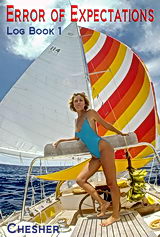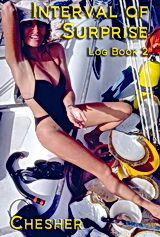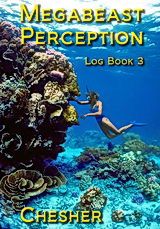THE UPLIFT FACTOR
This is awareness.
"So, how was Port Moresby?" Freddy asks as I hand down my luggage through the companionway.
"God what a place. Its so horrible in so many ways I don't know how to begin to describe it. The only good thing I saw there was a stunning movie about how bad the place is."
"They made a movie about how bad the place is?" Freddy gets a pretty little frown look between her eyes.
"A really good one. They showed it at the University. PNG University kids made it. They had a European director, but otherwise they wrote, filmed and edited it. It was about a young guy who leaves his home in the overpopulated highlands and goes to Port Moresby to find work.
"Here is this innocent young dude from the bush. He's one of 6 boys in his family and their big problem is land. You would not even believe the shots of the highlands. You know what it looks like?"
"Jungle?" Freddy helps me unpack. "Mountains?"
"Mountains yes, jungle no. Parts of it look exactly like films of the middle east; the land is rocky and barren from over farming. There are too many people, very primitive slash and burn farming no crop rotation, and the soil is essentially mountain rain forest soil. Or, I should say, was mountain rain forest soil, cause it's all washed away now. The young guy feels like he should go to Port Moresby to make money to help his starving family and also to get his extra mouth out of the scene so his kid sister can have his share of the food."
"Grilled Mackerel OK for dinner?"
"Sure. Terrific. His uncle lends him the cash to fly to Port Moresby and off he goes. His idea of a big time is reading a Phantom Comic Book. Nobody ever told him what work was, just that he can get a Job and earn Money in the big city.
Boy, does he get a big surprise when he lands in Port Moresby. Anybody would. Port Moresby is a colonial city ruled by a confused neo-colonial (sorry, independent) white bureaucracy (sorry, a localized government with white advisors) during the day. At night it is ruled by gangs of young, unemployed black men. It was too well done, that movie. It left the same deep loathing in my head the city leaves in my heart."
"How did it end?" Freddy puts some tea and brownies on the dinette.
"In the final reel, the head of one of the black gangs buys the hero a ticket back home. By this time, everybody in the audience is mentally screaming out for him to take the ticket and scram. Most of the audience is ready to leave Port Moresby, too. The kid goes back to the highlands, but nothing has changed there. Still the overpopulation problem. Still no garden land. No food. No money. No work. The audience went home, still no solution to the increasing crime, poverty, hunger."
"Whenever I think of Port Moresby, I think of low tide. I remember driving along in Peter's car, headed into the center of the city, looking out to sea and seeing a thousand people out there on the tide flats searching for anything to eat."
"Sounds terrific, I guess independence is working well," Freddy banters. I munch on a brownie. It's delicious. Moira's quiet cabin surrounds me. Walter Cat is just lying on the settee purring to himself. I'm bushed from the trip and depressed from the actuality of humanity screwing itself.
"I met a lawyer at the University. He told me Australia gave PNG its independence because some smartassed lawyer figured out the citizens of Australia's colony should legally be entitled to welfare. Since about 90% of the Aboriginal population of Australia is already sucking on the taxpayer's welfare tit, the Aussie government panicked."
"I guess so. Imagine another 3 million welfare cases, most of them living in the jungle, getting the same beer money as all the aborigines."
"He told me, just before independence day, all the locals went around putting their names or, if they couldn't write, big chalk X marks on all the stuff they would get when the white-people were kicked out. Most of the maids had the idea they would get the houses where they were employed. Everybody's cars had X marks. He really freaked out when he went to his office and found X marks on every one of his books in his law library." I chuckle.
Freddy, however, just looks thoughtful. "Left alone," she says, "like the people in the little sea villages of the islands, the Papuans are wonderful people."
"You think? Left alone, they were head hunters. We would have had to be well armed to doodle around out here not so long ago. But I know what you mean. The people fit in to their own niches and did OK until recently."
"Too many people. That's the basic problem. Too many people for the islands to support. Think of all the medical aid programs to increase the number of people." Freddy has this idea she always comes back to. In a moment she'll say, "There's only so much intelligence...."
"The planet has only so much intelligence to go around," She gives me Freddy's Axiom. "As the number of people increase, the IQ drops accordingly."
"Sometimes I think you're right," I agree, as usual. The effect seems to be the same even if her logic is a bit weird. Too many people means the schools (if any) are less and less effective. Time for thought and education diminish. Nutrition gets worse.
I think of all the United Nations schemes to "develop" the country and the World Bank plots to aid and abet these schemes and the other - countless other - groups and societies of do-gooders whose major goal in life is spreading their own image everywhere. "Remember the monument in Samarai?" I ask Freddy.
"Yeah, to make Papua New Guinea decent for the white man." She shakes her head sadly. "The whole business of civilization engineering is run by people with no cultural training or sensitivity at all. No coordination between programs - like between health and agriculture and forestry and soil management and water supplies and education. No understanding of what is going on socially or mentally in the process of altering a complex life-system. In any half-way decent Science Fiction book the whole concept of one civilization uplifting another is treated more realistically than the United Nations practices here on this planet. No wonder it always gets so screwed up."
"True, true, all too true, Freddy my little sweetheart. But uplifting may not be what it's all about. Don't forget it was not very long ago Trader John Politics had guys dumping Smallpox infected sailors on the islands to kill off the savages so they could chop down all the sandalwood trees."
"Which reminds me of the pearl divers. What happened with your Gold Lip report?" Freddy asks.
"Just what you predicted. Pete was happy to get the report, not too surprised by the results, and not very interested in doing anything more after he glanced at the summary. I tried to talk to him about village pearl culture development but he was not into small stuff. Big bucks. Big time development, that's what FAO wants for Papua New Guinea. If there had been 20 million oysters and not 20 thousand they might have gotten hyped up."
"Sounds like a real character," Freddy gets up to start dinner.
"Yeah, he is, OK. But he really does mean well, he's up to his keister in this coastal fisheries development scheme."
Freddy half turns, looks at me over her shoulder, and says,
"Lord save us from all the grandiose schemes of all the unthinking self-centered bureaucrats, from all the sanctimonious hoards who wish us well." There seems to be nothing to say to this, so I thumb through the FAO coastal development project brochure - the glossy booklet with its "The only good fish is a dead fish" theme.
"The village people NEED to have money. Development needs to move ahead. But not with small projects. No, Development has to be big time multi-million dollar stuff." I wave the booklet at Freddy, "Look at this book! Let me ask you this, Who did they print this thing for? Huh? For who? No islander will read it and marvel at the coming of National Fisheries. The politicians of PNG don't need a booklet like this. FAO in Rome did the booklet. For who? Who are they trying to convince with their snappy little publication?"
"The UN is a money-making organization. Publications are their main product. You are waving around a UN report of how they are going to spend all the money they sucker out of donor countries and banks. FAO sucks up 80% the money, doles out a portion to places like this, and prints up fancy reports to convince the world they are doing good things and should get more funds. Nobody is supposed to READ it. The more professional and polished it looks, the more likely everybody will just say Ohhh and Ahhh and hand over more bucks. It's all for Money,' Freddy concludes.
I stare at her and then at the book. "Hey, that's pretty cynical, Freddy." She shrugs and sizzles some fish into the pan. I think about what she said. "I suppose... You could be right."
"Of course I'm right, sweet baby. I'm always right."
"You don't think they really want to develop the fisheries and bring jobs and glorious opportunities to the poor, unemployed island people?"
"Money," She murmurs. "If they really wanted to help these areas develop an integrated, structurally sound society, they would approach everything much differently. There are unlimited examples of how this approach has failed everywhere in the world. They know it isn't going to help anything and don't care if it hurts as long as the army of UN bureaucrats get their huge salaries and lavish travel expenses."
"You don't think they are after leadership, power, prestige?" I demand.
"Individually and personally, the key factor is money," she says, patiently. "Politics, economics, and humanitarian factors act like fences, borders for the play-pens."
"Screw them," I slam down the booklet. "Screw THEIR way. Do we all have to live by their standards? Can't people live in the sunshine, in the sea, in their homes, in their hearts? Being WITH each other rather than AT each other? Who needs money out here where fruit grows on trees and fish are there when you need them in the sea?"
Freddy brings over a big platter of fish with plantains and fresh lime slices.
"There are so few places left where we can live with Earth and not with civilization. Where the weather is fine and people smile and don't really care or know what time it is - where punctuality is just a long very strange sounding word. Where you can say, "I'm glad I can do whatever I'd like tomorrow."'
"Come on, it's OK, don't worry about it. Don't take it so seriously. You can do whatever you want to tomorrow. Or tonight, for that matter." She cuddles, suggestively.



